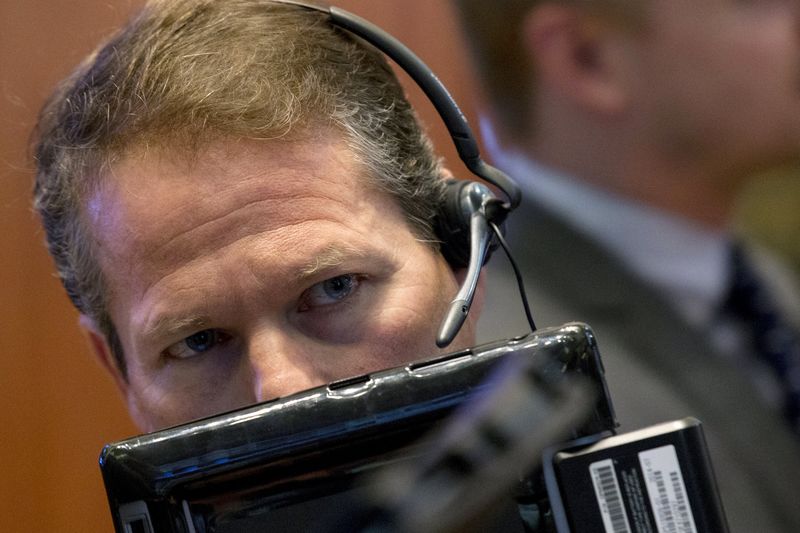Intel stock extends gains after report of possible U.S. government stake
* Asian stock markets: https://tmsnrt.rs/2zpUAr4
* Fall in U.S. jobless rate pushes stocks higher
* Unrest in Hong Kong could weigh on market sentiment
* Investors are cautious before U.S.-China trade talks
By Stanley White
TOKYO, Oct 7 (Reuters) - Asian shares edged higher on Monday
after data showed the U.S. unemployment rate dropped to the
lowest in almost 50 years, easing concerns of a slowdown in the
world's largest economy.
MSCI's broadest index of Asia-Pacific shares outside Japan
.MIAPJ0000PUS rose 0.18%. Australian shares .AXJO were up
0.5%. Japan's Nikkei stock index .N225 opened higher but
reversed course and fell 0.3%.
U.S. stock futures, ESc1 fell 0.44% in Asia on Monday
after the S&P 500 .SPX surged 1.4% on Friday.
The offshore yuan CNH fell 0.3% to 7.1352 to the dollar
after Bloomberg reported that Chinese officials are signalling
they are increasingly reluctant to agree to a broad trade deal
pursued by U.S. President Donald Trump. There was no onshore yuan trading, as Monday is the last day
of a long China holiday for its national day.
The media report also pushed up safe-haven assets such as
gold and the yen.
Crude oil futures extended declines in a sign that investors
remain cautious about a resolution to the trade dispute.
Sentiment toward the U.S. economy deteriorated sharply much
of last week after disappointing data on manufacturing and
services suggested the trade war was taking a toll, and more
rate cuts would be needed to avert a potential recession in the
world's biggest economy.
But a modest September increase in U.S. jobs, announced on
Friday, eased some of these concerns and lifted U.S. markets
that day. The U.S. unemployment rate fell to 3.5% in September
to reach the lowest since December 1969. Non-farm payrolls also
grew in September, but slightly less than expected. "Moderate job growth and subdued inflation in the United
States is a positive for stocks," said Shusuke Yamada, head of
FX and Japan equity strategy at Merrill Lynch Japan Securities
in Tokyo.
This week, the main focus will be the high-level U.S.-China
trade negotiations expected in Washington on Oct. 10-11 to see
if the two sides can end a bruising year-long trade war that has
hurt global growth and raised the risk of recession.
"The dollar is a little soft heading into U.S.-China trade
talks," said Yamada. "I see some scope for yen gains, but it is
not likely to be a big move higher."
The United States and China have slapped tariffs on each
other's goods as part of a long-running dispute over Beijing's
trading practices, which Washington says are unfair.
Central banks around the world have been easing policy to
try to offset the impact of the trade war.
The Federal Reserve has lowered interest rates twice this
year. Before the jobs report, traders saw a 85.2% chance the Fed
will cut rates by 25 basis points to 1.75%-2.00% this month, but
that chance has now fallen to 81.1%, according to CME Group's
FedWatch tool. FEDWATCH
The yield on benchmark 10-year Treasury notes US10YT=RR
rose to 1.5238% on Monday compared with its U.S. close of
1.5140% on Friday.
Spot gold XAU= , an asset often bought during times of
uncertainty, rose 0.15% to $1,506.93 per ounce. GOL/
The yen JPY=EBS , also considered a safe-haven asset, edged
slightly higher to 106.83 versus the U.S. dollar and gained to
72.17 per Australian dollar AUDJPY= .
U.S. crude CLc1 dipped 0.21% to $52.7 a barrel. Brent
crude LCOc1 fell 0.39% to $58.13 per barrel. In addition to
worries about the global economy, signs of oversupply in the oil
market are weighing on futures prices.
Political instability in Hong Kong could hurt market
sentiment after China's army took the unusual step of issuing
warnings to anti-government protesters in Hong Kong over the
weekend. Hong Kong's stock market is closed on Monday for a public
holiday. Trading will resume on Tuesday.
Four months of often violent protests against Chinese rule
has pushed the former British colony to the brink of recession
and posed a serious challenge to Beijing's control of the city.
(Editing by Jacqueline Wong and Richard Borsuk)
